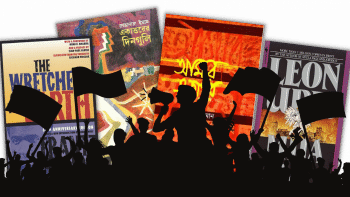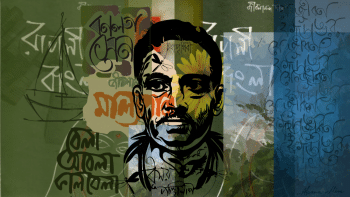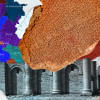War and peace and poetry and poets

How can you talk about peace without taking into account war? Both are subjects not only of Tolstoy's great novel but also of the two founding epic poems of Greek as well as Indian literature. About the Iliad, I recall now the great essay the French philosopher Simone Weil wrote titled, "The Iliad, or The Poem of Force." To her, the epic reveals the overwhelming power of force unleashed by war/ rage/ lust that it unleashes or induces. But the poem to her also shows human love offsetting the deaths and horrors marring human relationships, implying the need for peace and making it an imperative in human relations. The subject of the poem then is also pity/ sympathy/compassion. These are qualities needed to counter wrath and reaffirm the place of love for each other. I think of WH Auden's great poem induced by the onset of the Second World War, "September 1, 1939". Its immortal and wise line tells us unequivocally the kind of essential truths poetry can highlight for us—"We must love one another or die."
The Indian epic I have in mind which deals with war but also implies the need for peace is the Mahabharata, Vyasa's enduring masterpiece. When Krishna is given the task of becoming the envoy of peace, he takes it with the conviction that war can only lead to endless death; it must thus be avoided and peace pursued assiduously. Here and elsewhere in the epic, it is implied that amity and harmony must be sought actively and war is not the only option available when human relationships are scanted.
On the subject of epic narratives, I can't resist talking about the late 19th century Bangla prose epic, Bishad Sindhu, a masterpiece that I translated into English and that Bangla Academy published in 2018 as Ocean of Sorrow. The narration is entirely in prose, but again and again its author Mir Mosharraf Hossain comes close to poetry in discussing the anguish and distress as well as the intense emotions of losing loved ones caught up in the turmoil of war. Indeed, as we come to the end of the mammoth epic—500 plus pages in my translation—we can read the narrator seeking God's mercy and trying to figure out the divine scheme of things. As he puts it, "No poet has the ability to exercise his imagination to articulate that plan or explain its essence to everyone either." Clearly, it is poetry that comes closest to articulating the empathy that war necessitates and God's plan to have it in the scheme of things.
If we move to dramatic poetry on the subject of war and peace, it is Shakespeare's name that comes foremost to my mind. Whether we turn to the history plays, or the Roman plays, or the tragedies, we find the centrality of the theme. Whether depicting civil war, or war among neighbouring kingdoms, or wars issuing from imperial expansionist designs, we find Shakespeare dwelling on the psychology of war-mongers and the deeply felt need for peace of ordinary people. Henry IV, Part I begins, for instance, with the king expressing the exhaustion internecine wars have brought to Britain and the havoc done to nature—human or nonhuman—by it. He would like the island to experience peace, although ironically he would now like to aid the Christian military cause in the Crusades.
Hamlet begins in the ramparts of a castle and ends with numerous dead people, including the protagonist, but Fortinbras, now destined to be King of Denmark as well as Norway, indicates that there has been enough war; peace was what was needed now. War is destructive and exhausting; though the impulse to war is part of human nature, so is the urge to have peace prevail everywhere. That seems to be the message Shakespeare has for us all in this and other plays.
Imperialism, nationalism and modern weapons of mass destruction, including, most horrifically, nuclear bombs on the one hand, and unending missions and visions to thwart warmongers and bloody expansionists on the other, have resulted in war poetry and poetry of resistance.
Truly, poets are best in articulating the desire for peace amongst peoples. They know it is difficult but they also know it is so desirable. I think of WB Yeats in "The Lake Isles of Innisfree" where he talks about an idyllic isle where the poet could "have some peace…for peace comes dropping slow". Always, it is something to be craved for because the world knows too much turmoil; the mind and the body will always seek peace. It may be elusive but must be sought for. As the 17th century English mystical poet George Herbert puts it, "Sweet peace, where dost thou dwell? I humbly crave/ Let me once know." Similarly, the 19th century American poet Emily Dickinson expresses intensely the need for something which is ever-elusive and sometimes something of an illusion— "I many times thought peace had come/When Peace was far away—/ As wrecked Men—deem they sight the Land—At Centre of the Sea". It may seem near but is never that easily graspable. After all, life is a perpetual attempt to experience "fictitious shores/Before the harbors be."
Emily Dickinson's English contemporary, Matthew Arnold, wrote his most famous poem, "Dover Beach" where war as well as the ferment of ideas calling into question faith were troubling all eminent Victorians. Love appears then the best antidote to such turmoil-inducing things. Arnold is troubled not merely by a receding "Sea of Faith", but a world "swept with confused alarms of struggle and flight, /where ignorant armies clash by night."
More than any previous centuries, the 20th has been most devastated by wars. Imperialism, nationalism and modern weapons of mass destruction, including, most horrifically, nuclear bombs on the one hand, and unending missions and visions to thwart warmongers and bloody expansionists on the other, have resulted in war poetry and poetry of resistance.
Take the First World War English poet, Wilfred Owen's moving poem "Anthem for Doomed Youth" as an instance. Its first stanza is worth quoting in full for the way he remembers the young lives lost and the endless corpses left behind by war machines fueled by ethnic hatred and nationalist egos—
What passing-bells for these who die as cattle?
— Only the monstrous anger of the guns.
Only the stuttering rifles' rapid rattle
Can patter out their hasty orisons.
No mockeries now for them; no prayers nor bells;
Nor any voice of mourning save the choirs, —
The shrill, demented choirs of wailing shells;
And bugles calling for them from sad shires.
This paper has been edited for brevity. It was first presented in the Poetry Conference's panel for international participants on the theme of poetry and peace. All translations from Bengali poets in this piece are by Fakrul Alam unless specified otherwise.
But if war fomented by nationalism appeared to be overwhelming and all-engulfing, and if imperial egos seemed to be also involved, the 20th century saw poetry of resistance as well. Take the Bengali poet—our national poet—Nazrul Islam—as an instance.
He had joined the British Army at one point, but soon he would become the rebel poet who would use poetry as a weapon against unjust wars and make it a literary genre that would help take oppressed people to peace and brotherhood. The poet, he claims, is volcanic, tempestuous and fierce in the cause of rebellion in raising the "flag of man's triumph" but he is also the harbinger of peace, "Orpheus's lute, /Lulling the restless ocean to sleep," bringing "calm to a fevered world" by enthralling people with "melodies" of peace.
The poet, then, takes up poetry to protest against tyranny and unjust governments, but his penchant really is for peace. But Nazrul's optimism about the poet's role is not shared by all poets. I am thinking here of my favourite Bengali poet of the 20th century, Jibanananda Das, who wrote about darkness that had descended on the world with the Second World War, and on partition and global uncertainty caused by massive destruction. This surely is why his 1947 collection of poems is called The Darkness of Seven Stars and why he includes in it poems about shipping lanes "crowded by magnetic mines and unending convoys" and "splinters" lighting up "skies into countless ghosts." Where could peace be found and the rebel poet appear in such a situation?
Rabindranath Tagore's conclusion to his speech, "Crisis in Civilization" comes to my mind at this point. It was written as the Second World War broke out, confirming his worst fears about nationalism, expansionist and imperial proclivities. This is what the poet-savant had to say then: "As I look around I see the crumbling ruins of a proud civilization strewn like a vast heap of futility. And yet I shall not commit the grievous sin of losing faith in Man. I would rather look forward to the opening of a new chapter in his history after the cataclysm is over and the atmosphere rendered clean with the spirit of service and sacrifice."
Let me conclude by talking about our own Liberation War and the anguish and pain felt by poets everywhere at what was happening to Bangladesh after the genocidal bid to thwart Bangladeshis from becoming independent. American beat poet Allen Ginsberg's 1971 poem/song, "September on Jessore Road" articulates his distress and grief at war refugee suffering as well as his rage at the American support of the Pakistani war machine:
Ring O ye tongues of the world for their woe
Ring out ye voices for Love we don't know
Ring out ye bells of electrical pain
Ring in the conscience of America brain.
And here is the Bengali poet Shamsur Rahman celebrating freedom unforgettably and the peace that it could bring in:
Freedom, you're
the wife's raven tresses, tempestuous in the untamed wind.
Freedom, you're:
The colorful kurta on a young boy.
The playful sunlight on a girl's supple cheeks.
Freedom, you're:
The home amidst a flower garden; the warble of koel-bird.
The twittering leaves of antediluvian banyan trees.
My notebook of poetry, to pen poems as I please.
[Translated from 'Shadinota Tumi' (Bangla) by Syed Manzoorul Islam.]
Poets keep evolving in amazing ways. One of my favourite Bangladeshi poets of recent decades, Shaheed Quaderi, has a postmodern take on poetry, war and peace in "Greetings, Dearest" where the poet-lover assures his beloved that he will "fix it so that/night and day the army, navy and air force will circle round and salute/only you, dearest" (Kaiser Haq's translation). Love is the best prescription for peace and antidote to war! Death is inevitable, but whether in war or peace, poets will keep producing beautiful poetry about life, hope, love, and peace despite war, death and the decay of values—forever and forever.
This paper has been edited for brevity. It was first presented in the Poetry Conference's panel for international participants on the theme of poetry and peace. All translations from Bengali poets in this piece are by Fakrul Alam unless specified otherwise.
Fakrul Alam is Supernumerary Professor, Department of English, University of Dhaka.

 For all latest news, follow The Daily Star's Google News channel.
For all latest news, follow The Daily Star's Google News channel. 










Comments